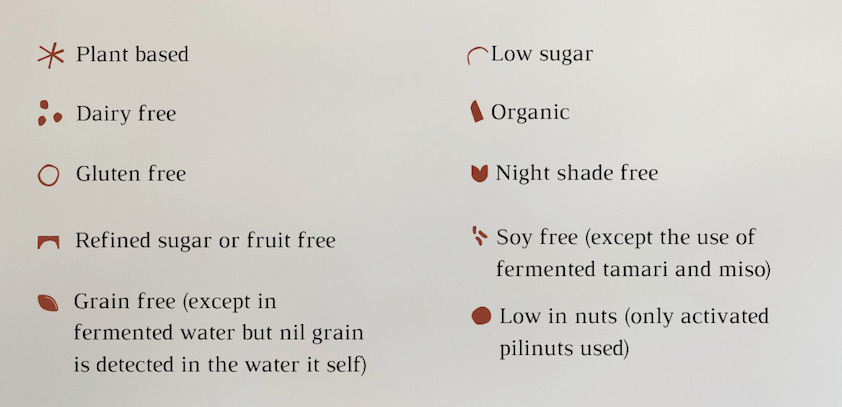
Cucumber & Tremella Granita
A Sicilian-style granita for hot days and hydrated cells When

Kick-start, energise, rejuvenate
All carefully planned and prepared to help nourish, reset and rejuvenate the body and mind.

The recent unveiling of the fasting-mimicking diet, or FMD, marks the first time in human history we have found a way to push back our biological clocks. In other words, it allows us to refresh many of our cells to, in effect, “de-age” our bodies by 2.5 years. This biological de-aging and the variety of other benefits unlocked by the fasting-mimicking diet are exciting to say the least, and the revolutionary diet puts them within reach of almost anyone.
The fasting-mimicking diet is a plant-based 5 day meal plan that triggers the benefits associated with water-only fasting. It consists of foods extremely low in calories, carbs, and proteins. Not only do those nutrient-rich foods make the diet easier to stick to than a traditional fast, but they also provide the fuel that your body needs to stay vital and alert. [11]

The fasting-mimicking diet is not just a collection of random healthy foods thrown into a meal plan. Instead, each food item is carefully chosen through a scientific process. The precise amount of nutrients of each type in every meal is monitored closely to provide specific benefits to the body, keeping calories to the absolute minimum to preserve the fasting effect while making sure to keep enough vitamins and nutrients to provide energy. [22], [33].
The Ancient Greeks were the first ones to realise that fasting had positive biological effects [44]. They noticed that it tended to give people clearer skin, sharper cognitive performance, and an overall more youthful “pep in their step.”
Now that we have more advanced observational tools at our disposal, we can see that the Greeks weren’t just imagining things; the widespread positive impacts of fasting [55] are very real. For instance:
All of these positive impacts of fasting carry over to the fasting-mimicking diet. In fact, the diet very well may amplify the effects because of the nutrients it provides your body during the “fast” that it can in turn use to fuel the processes further.
Over the past decade, over 165 studies, papers, and articles coming from 25 different countries have been published about FMD. Experts from a wide variety of fields, from oncology to nutrition dietetics to cell biology, have contributed to the research. The leading researcher on FMD is Dr. Valter Longo, a cellular biologist at the University of Southern California.
Although the studies look at the fasting-mimicking diet from different perspectives, however, they all agree on one thing: the diet provides unprecedented health benefits for a relatively easy-to-implement food regimen. The benefit that is most focused on in the body of research is the diet’s strong correlation with a decrease in cancer risk. It’s not too surprising, since younger cells like those generated by the diet are less likely to become cancerous. Still, it’s a huge deal in the medical community.
Almost all of the studies back the diet’s other purported benefits: weight loss, increased cognitive ability, a strengthened immune system, and more.
Since fasting diets originated, people around the world have embraced the concept because of its many health benefits [66]. The benefits range from physiological to psychological to biological, most notably including:
So how do you get started on FMD?
Shoku Iku acts as a bridge between the dieticians who developed the fasting-mimicking diet and the public. We offer the “Advanced Reset”, a 5-day fasting-mimicking program meal plan, to customers in the Melbourne and Sydney Metro Areas. The plan is a collaboration between food scientists, nutritionists, and our highly experienced master chefs trained in both Japanese and Australian cooking techniques.
The Advanced Reset meals include items like shirataki noodles with pesto, curry-spiced coconut crackers, pumpkin soup, and avocado cacao mousse. Each of the items has hours of care put into its recipe design so that it contains exactly the amount of nutrients your body needs to run efficiently but still mimic the effects of fasting. All items are plant-based, gluten-free, dairy-free, organic, and without refined sugars.
Find out more and order the plan at the Shoku Iku Advanced Reset Pages for the Melbourne and Syndey metro areas.
Read more: Advanced RESET – All You Need To Know
A few tips for success when you begin on FMD:

So what do you need to know before you begin the fasting-mimicking diet?
Preparing and self-administering your own FMD is possible, but even nutritionists do not recommend it because of how incredibly precise all the nutrient amounts in the food need to be to achieve maximum effect.
When you start on one of Shoku Iku’s fasting-mimicking plans, you can expect the meals to be carefully packaged and delivered to your door every morning. Each delivery will include between three and four items – a soup or salad, a fasting-mimicking meal, a snack of either crackers or a medicinal drink, and maybe even a healthy dessert.
What time to eat is up to you, but we recommend eating all of your meals for one day within a 4-10 hour period and spreading them out during that time. We also discourage eating within three hours of bedtime.
People who should not go on the fasting-mimicking diet include:
The fasting-mimicking diet is a beautiful culmination of decades of nutritional science research combined with holistic dietary practices [77]. Services like the RESET programs from Shoku Iku bundle up all that work into a series of delicious and refined meals and bring them right to your door.
Reference:

A Sicilian-style granita for hot days and hydrated cells When

Ashitaba (Angelica keiskei) is often described as a “longevity herb.”

In our modern wellness landscape, “biohacking” often evokes images of
Copyright Shoku Iku © 2024 | All Rights Reserved.
The statements on this website have not been evaluated by the TGA or FDA. These products are not intended to diagnose, treat, cure or prevent any disease.
Sign up to receive your discount.